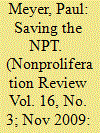| Srl | Item |
| 1 |
ID:
091673


|
|
|
|
|
| Publication |
2009.
|
| Summary/Abstract |
For more than forty years, the Treaty on the Non-Proliferation of Nuclear Weapons (NPT) has provided major security benefits to the international community; however, the treaty is suffering from internal and external pressures, and benign neglect on the part of its members is undermining its authority. To ensure the treaty's continued viability, it is time for member states to start showing the NPT the respect it deserves and to renew their commitments to its fundamental purposes. Achieving this requires remedial action in at least four areas of vulnerability: reinvigorating nuclear disarmament; strengthening nonproliferation; overcoming the NPT's institutional deficit; and fostering a rapprochement between NPT and non-NPT states that does not abandon the goal of treaty universalization. There is still time before the 2010 NPT Review Conference for concerted action to restore the NPT's vitality and for the United States to resume its leadership role on behalf of the treaty and its membership.
|
|
|
|
|
|
|
|
|
|
|
|
|
|
|
|
| 2 |
ID:
091671


|
|
|
|
|
| Publication |
2009.
|
| Summary/Abstract |
The rejection of the Comprehensive Nuclear-Test-Ban Treaty (CTBT) by the U.S. Senate in October 1999 could have been avoided, and the consequences of that vote still loom in the minds of supporters of the treaty. President Barack Obama has embraced the vision of a world free of nuclear weapons, and a key element of the Obama administration's arms control agenda is delivering on U.S. CTBT ratification. In order to secure the two-thirds majority in the Senate necessary to ratify the treaty, senators that remain skeptical of nuclear disarmament must also be convinced that the entry into force of the CTBT is in the national security interest of the United States. This article provides an analysis of the issues surrounding U.S. CTBT ratification divided into three segments-verifiability of the treaty, reliability of the U.S. stockpile, and the treaty's impact on U.S. national security-and concludes that CTBT ratification serves the security objectives of the United States. The CTBT constitutes an integral component of the multilateral nonproliferation architecture designed to prevent the proliferation of nuclear weapons, and it constrains the qualitative development of nuclear weapons, thereby hindering efforts by states of concern to develop advanced nuclear weapons.
|
|
|
|
|
|
|
|
|
|
|
|
|
|
|
|